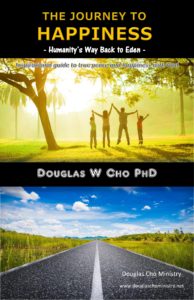"The Journey to Happiness: Humanity's Way Back to Eden"
This book written by Dr. Cho is on sale on the following online bookstores:
Paperback from Amazon.com
https://www.amazon.com/Journey-Happiness-Humanitys-Back-Eden/dp/1532322534/
e-book from Amazon.com
https://www.amazon.com/Journey-Happiness-Humanitys-Back-Eden-ebook/dp/B06XC63QSS/ref=sr_1_fkmr0_2?ie=UTF8&qid=1488883405&sr=8-2-fkmr0&keywords=the+journey+to+happiness+douglas+cho
e-book from Lulu.com
Here, we provide a preview of the Foreword that tells
you why I wrote this book and what it is for.
Foreword
Are you happy? If yes, how solid and lasting is your happiness? Or is it a passing temporary feeling? If no, do you wonder why you are not happy and seek to know the answer to true happiness? And do you wonder if what you feel now is really being happy at its core?
We all want to be happy. But not all of us are happy. In fact many of us are unhappy. And we don’t know why. Yet we strive to be happy by pursuing different life styles and solutions, either self-devised or advised by others. There are numerous books on happiness out there. Yet people are still perplexed about how to be happy with their life. People watch TV and movies thinking to find things they watch might allay their unhappiness. We seek thrilling activities like sky diving, mountain climbing, and even hazardous sports activities that require risking our lives and some of us die in the process. People seek happiness by engaging in religious activities: some find happiness in them but many move on thinking they have found happiness.
My childhood was an unhappy one although outwardly our family was no worse economically than most Korean families in South Korea that experienced the Korean War of 1950 to 1953 and the tumultuous social conditions afterwards when this small, divided nation was rated as the poorest country in the world together with Ethiopia. We did not know of any higher standards of living then. There was no mass media that we know of today here in America that informed the citizens about the living that peoples of advanced western countries were enjoying. So most of us lived each day just to survive and live on, thinking our future might be better than the present. Politically dissatisfied groups, particularly the young students, rose up against the corrupt regime of Syngman Rhee in 1960 and somehow threw it down. When the first democratically elected cabinet failed to give vision and hope to the people and the military for a better tomorrow, the latter took over the rein of the country in a military coup in 1961. Then the country, led by a young former Army General Park Chung Hee, marched along a rapid path of modern industrialization. Forever hungry for democratic ideals the young generations of succeeding decades in this traditionally Confucian nation, with a history that spanned over 4,000 years, pressured the ruling military powers to yield to their yearnings. Yet the society of South Korea seems to be full of discontent and unhappiness. Why is it that the people of this country who have achieved an amazing feat from bringing up their country from the poorest of the world to the world’s 12th largest economy be perhaps less happy and content than they were when they were the poorest people in the world seven centuries ago? This fact puzzled me for some time and kept me wondering why they are not happy when their economic status has dramatically advanced.
I see a similar condition here in the U.S. which is the world’s richest and most powerful nation in the world. Although its happiness index of 7.1 is the 13th highest in the world, the large gap between the poor and the rich strata in the society has driven people in both middle and lower income categories in America to feel very unhappy and worried about their future. According to a report the top 20% of US households own more than 84% of the wealth, and the bottom 40% combine for a paltry 0.3%. A number of analyses of the recent phenomenon of America’s presidential election process attribute the mass favoring of Donald Trump as the republican candidate to this very economic discontent in the middle and lower income classes of the society. According to one of such reports, “Americans are unhappy with the current institutions and politics. Over two-thirds of Americans believe that the economic system favors the wealthy and that government wastes a lot of our money.”
While social study reports indicate sources of these unhappiness and discontent conditions in people of different countries and regions, where such sources as often cited as measurable social indices such as GNP, per capita GNP, unemployment rate, wealth distribution patterns, education level and perceived corruption in the society, they often fail to take us to the core of the problem, that is, the heart of ourselves as humans.
This book is not intended to be an academic or philosophical discourse on happiness. Many scholars have done that task admirably and yet many people are still unhappy. The world is in turmoil and it does not know where to turn for solutions. Leaders of this world or of our communities and religions have failed to point to the way of true happiness in our individual lives, homes, communities and the world in general. Years of searching, praying and meditation have led me to the compulsive urge to write on this topic because I want to share what is in my heart and mind—deep convictions and revelations that came to me over many years of my life—so that the book could benefit the readers and help contribute to happiness in your lives as well as in this troubled world.
We are inherently unhappy because we are not with God—we have alienated ourselves from our Creator. A baby is unhappy and feels insecure when its mother is not within its visual reach. Mother is the source of nourishing and safe-keeping to the baby. Absence of mother puts the child into an insecure position and the baby knows instinctively when it is left alone. Not all babies left alone will instantly cry out to express its insecurity and need of care. But sooner or later a baby gets to know when it is left alone and comes to feel the insecurity and loneliness when it is left alone without the presence and care of its mother. We are all God’s creation. We had to leave the creator’s presence and started on our own journey when Adam and Eve sinned and were chased out of Eden. The serpent had seduced them into thinking their eyes would be opened and they would be a gods, knowing good and evil. [Genesis 3: 5] The serpent’s prophecy came to be true. Their eyes were opened and came to see they were naked before God and were made ashamed. And because of their shame they hid themselves from God. [Genesis 3: 8] Eventually God made the judgment on them and the serpent so that Adam and Eve were driven out of Eden. Since this event human beings have been on our own, away from the Creator’s presence. And this has had a serious psychological effect—we feel insecure, unhappy and without true peace, both inwardly in each of us and in the world, in general.
We should be on a journey going back to Eden, where God is waiting. There we will be reconciled to our Creator. There we will find true peace and happiness as Adam and Eve did knowing that we  are in God’s grace and blessing. This journey must occur during our life time here on the earth because God has given a time of earthly life just for such a purpose. He has provided all things for us to enjoy His blessings and provisions so that we might come to know Him, come to make this journey back and find true peace and happiness. It is as simple as that. So let us examine this thesis in more detail and be persuaded of this simple truth. What we do after coming to this truth is up to each of us. However, there is plenty of help and encouragement available to finding the path of going back and making the journey. We will discuss them also. Have an enjoyable journey and may God bless your efforts!
are in God’s grace and blessing. This journey must occur during our life time here on the earth because God has given a time of earthly life just for such a purpose. He has provided all things for us to enjoy His blessings and provisions so that we might come to know Him, come to make this journey back and find true peace and happiness. It is as simple as that. So let us examine this thesis in more detail and be persuaded of this simple truth. What we do after coming to this truth is up to each of us. However, there is plenty of help and encouragement available to finding the path of going back and making the journey. We will discuss them also. Have an enjoyable journey and may God bless your efforts!
Fall 2016; Alexandria, Virginia
Douglas Cho
